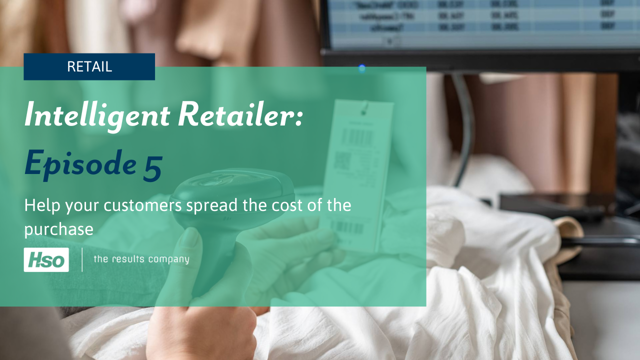Get more insights from HSO Retail Experts

The Rapidly Developing World of Payment Systems
Payment processing systems in retailing are undergoing meaningful and rapid change. Contactless payment has rapidly become the norm for purchases under a pre-set limit (£100 currently in the UK). At the same time, a plethora of other payment options has opened up including Amazon Pay, Apple Pay, Google Pay, etc. These have followed PayPal in that these payment methods involve the intermediary paying the retailer and collecting the money from your chosen payment card or bank account.
These payment providers do not give your card numbers or bank details to the retailer, and they do not charge the consumer for the service. They receive payment for their part of the service from the banks or credit card companies. It potentially improves the shopper’s security and provides better protection against fraud. You don’t even need to carry the card, but if you don’t, you do have a problem if your phone battery goes flat.

The big challenges with online retail today include:
In Europe, Klarna is growing as a payment mechanism and they are unique compared to the other brands, because they give the shopper the option of paying in instalments.
These payment options are a limited form of digital wallet. Digital wallets are slowly becoming more popular in their wider sense. The wallet holds details of your payment cards or other payment mechanisms, such as loyalty cards and coupons. Consumers select their preferred payment method and present the phone to a contactless terminal to complete the payment. Digital receipts can then be stored in the wallet automatically for a period of time, say up to a year. The wallet may also hold other documents like boarding passes and travel tickets.
These payment options are a limited form of digital wallet. Digital wallets are slowly becoming more popular in their wider sense. The wallet holds details of your payment cards or other payment mechanisms, such as loyalty cards and coupons. Consumers select their preferred payment method and present the phone to a contactless terminal to complete the payment. Digital receipts can then be stored in the wallet automatically for a period of time, say up to a year. The wallet may also hold other documents like boarding passes and travel tickets.
One issue yet to emerge properly with digital wallets and payment methods like Apple Pay, is who owns the data. Is it the wallet provider or the bank? Open Banking is a global initiative but take up is much higher in Europe because the EU has got behind it. Not many retailers support open banking yet at point of sale, but its use is likely to grow. With open banking a shopper can present their bank card to a contactless terminal and the transaction can potentially be completed with the corresponding bank, without a payment processor organisation in the middle taking a merchant fee. The retailer gets settlement for the transaction in near real time, makes a bigger margin, and depending on how the future develops, may be able to offer the consumer an extra discount from the offset merchant’s fee.
In fact, payment methods like Apple Pay, where the consumer provides the Apple digital wallet with their bank account details or their debit card details, are a form of open banking. Some industry analysts think companies like Apple Pay are becoming the gold standard for frictionless payments in payment processing. The widespread adoption of open banking could significantly reduce the market share taken by credit cards over time. Because there is so much change happening in the payments area, any retailer embarking on a new payments project, or an EPOS project, will need to be conversant with all the latest developments, so they offer an appropriate range of payment options to their target customer base.
Retailers need to think ahead and do their research, so as not to get caught up in unfortunate situations. For example, at the time of writing the UK Treasury has announced that the Financial Conduct Authority will now oversee buy now pay later cards (BNPL) like Klarna. BNPL is now a £2.7bn market and consumer groups are expressing concern about BNPL users potential bad debt problems.
Help your customers spread the cost of the purchase
In the current climate, customers might not have as much disposable income as they had before. So one thing we can do to help customers is to allow instalment billing. This will enable us to split the payment for goods over a period of time.
1. Tokenisation
While on the subject of payment cards, there are two methods that card payment systems providers use to ensure secure transactions. One is encryption and the other is tokenisation. In this latter method the card number is converted to a token whenever a payment is made. The card number is never stored anywhere it can be hacked. When the “card number” needs to be stored, the token is stored instead. It is mathematically almost impossible to reverse engineer a token back to the card number.


2. Why does this matter to us?
If a consumer shops online and in stores, they will mostly use the same card for their shopping purchases. If the same payment system is used in the online store and in the physical shops, every time a card is used, the same token will be generated. If the tokens are saved alongside the transaction details in both channels, the tokens can be matched, and a complete view of an individual shopper’s purchasing history can be generated. This is especially helpful for all customer relationship management purposes. Given a choice, always use tokenisation rather than encryption and use the same payment processing software in all channels.
3. Supplier Payments
This section is more relevant to the Buying and Finance teams rather than stores, but is payment related and many retailers fail to exploit it. Buyers negotiate deals with suppliers and part of that is the payment terms, often 60 or 90 days in retailing. Retailers benefit from favourable cash flows compared to other industries and often deposit surplus funds in interest bearing accounts or the overnight money markets until needed.
Train your buyers to include an advance payment clause in each contract. For example, if you choose to pay a supplier 14 days faster than terms, you can take an extra 3% discount and 5% if you pay 30 days faster than terms. Forecast your forward needs for cash and when you have more in hand than you need, rank suppliers as to who will give the best early settlement discount. Use the cash in excess of forecast needs to pay those suppliers early.
The fintech revolution has led to significant growth in the number of foreign exchange brokers and retailers are no longer so reliant on the main banks for Forex and currency hedging services. Some of the fintech startups in this space have better systems and easier integrations with internal financial systems than the mainstream banks. Companies are starting to find that they may have a wider range of banking partners than they ever did before. This is important for retailers to look out for and manage as so much buying is done in US dollars and hedging is often a key strategy for very seasonal retailers with long lead times.


Summary
The payment systems market is changing rapidly. While much of the focus for retailers, whether store or online based, is on consumer payment mechanisms, the buying operations are being affected too. That said, the major focus for most retailers is on store or online payments and keeping up with the changes needs a strong focus in current times. Secure and easy payment is an important component of customer service now. If you would like further input on anything covered above or further clarification on anything, please contact us and our professional staff will be pleased to respond.






